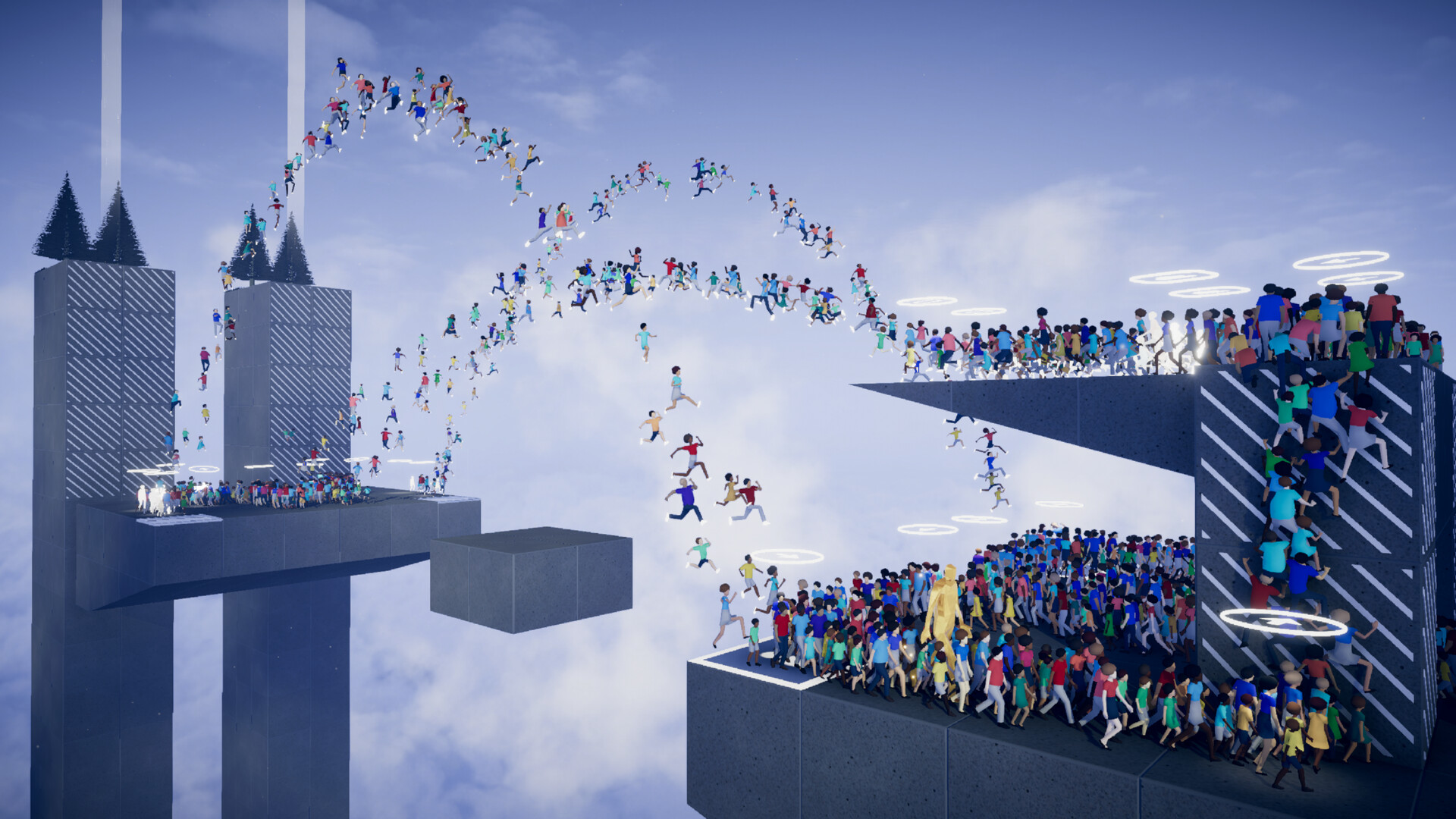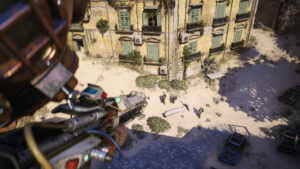
Humanity takes a lot of pride in how weird it is- which, given the fact that it’s coming from the same people who made the likes of Rez Infinite and Tetris Effect, shouldn’t come as a surprise. You play as a glowing, ethereal Shiba Inu, and at the behest of an otherworldly voice in your head, you embark on the task of guiding massive swarms of unthinking, unfeeling humans into gates of light at the end of increasingly complex obstacle courses. Right from the off, everything about the game is bizarre in a wonderful way, from its minimalistic visuals to its strange premise, and that, crucially enough, is not only something that contributes significantly to the game’s whole vibe, it’s also used in excellent ways to deliver some incredible puzzle gameplay.
Your task in all of the hundred-plus courses in Humanity’s story mode boils down to one thing- guide these endless waves of humans to the exit. Throughout the level, you’ll find obstacles to overcome and puzzles to unravel, all of which is done by placing commands on tiles that your flock of humans then obeys as soon as it walks over those tiles. On paper, it sounds incredibly incredibly simple, and when the game kicks off, it is simple. But constantly, throughout its surprisingly meaty campaign, it keeps layering on one complexity after another, one new idea after another, one new challenge after another, and keeps doing that until the very end. Humanity injects a consistent dose of variety, complexity, and creativity throughout its runtime, to the extent that if you were to somehow jump from the first level of the game straight to the very last, you might feel like you’ve been dropped into a completely different game.
"Right from the off, everything about the game is bizarre in a wonderful way, from its minimalistic visuals to its strange premise, and that, crucially enough, is not only something that contributes significantly to the game’s whole vibe, it’s also used in excellent ways to deliver some incredible puzzle gameplay."
When Humanity starts off, the commands that you have at your disposal are few and straightforward. It starts off with changing the direction your endless human stream is walking on, or commanding them to jump over a large gap. Then you unlock the ability to jump higher, or to jump longer, or to make your humans lighter so that each jump now has a different variation. As you progress further and further, you can command them to split off in different directions, use weapons against enemies, and more.
The levels themselves also keep getting increasingly complex as you get deeper into the game. They start out as simplistic collections of plain blocks with some gaps and ramps and walls thrown in there, but then they start introducing fans on the ground to make your humans hover in the air, or water bodies that they can float through, or walls that they can climb, or blocks that they can move- and all of that is just in the opening couple of hours. The pace at which Humanity introduces new mechanics, or new challenges, or new twists on old ideas ensures that it never feels like the game is coming even close to resting on its laurels. It introduces something new, executes it succinctly, and then quickly moves on to up the ante even further, constantly sliding up the complexity.
At the same time, Humanity never becomes too complex or overbearing, because it never throws all of its ideas at you at once. Every single level is a small box (literally) of a limited set of ideas mixed together, and never do things get too muddy. More often than not, there are only a handful commands that can be used per level, and though the challenges and obstacles you do face do get increasingly intense as you play on (especially in the latter stages of the game), the actual set of mechanics that you have at your disposal as you deal with those challenges always remains wonderfully succinct and compact.
"The pace at which Humanity introduces new mechanics, or new challenges, or new twists on old ideas ensures that it never feels like the game is coming even close to resting on its laurels. It introduces something new, executes it succinctly, and then quickly moves on to up the ante even further, constantly sliding up the complexity."
Levels themselves are also mostly quite compact. In the initial hours, the average length of a level can be between 10-15 minutes, and though some of the later ones do get a little longer than that, by and large, they’re all structured like bite-sized chunks that you can play at whatever pace you want. You can devour them all in large quantities in one go, or conversely, you can just hop into the game every now and then, finish a level or two, then hop back out. Regardless, the game always maintains a brisk pace, and thanks to how much variety it boasts across all of its levels, it never feels like it’s getting long in the tooth, regardless of what pace you choose to play it at.
Humanity also goes out of its way to ensure that your experience is as frictionless as possible when it comes to the actual puzzle-solving aspect. This is a game that involves a lot of trial and error, a lot of iterative problem solving, especially if you’re the kind of player that wants to collect the (partly) optional collectibles known as Goldies, who are big, golden humans that reward you with everything from cosmetics to new gameplay features, like being able to fast forward (which comes in quite handy). That trial and error, however, doesn’t often feel frustrating, because of how easy the game makes it to retry levels. Not only is the process quick and snappy, you can also choose to restart a level with all of your previous commands still in place, so it still feels like you’re making progress.
One aspect of Humanity’s gameplay that does deserve criticism is how it controls. As mentioned previously, you play as a Shiba Inu, which means you have to physically move the dog through the levels in order to place the commands you want to place, though I always found those controls to be a little imprecise and clunky. I would often miss jumps or find it hard to judge where that small glowing dog is on the screen, especially given how busy things can often get, which caused some annoyance. Later levels in the game also sometimes require you to quickly move across levels in order to change commands on the fly, and that’s when the frustration can really kick in. Though I do like the inherent weirdness of the idea of playing as a glowing dog that can command never-ending swarms of humans, I do feel Humanity could have been better served as a puzzle game that just lets you use a cursor.
"From its minimalistic yet striking visuals to its excellent synth soundtrack, from the core simplicity of its design to the startling complexity that constantly spawns, this is a game that has so much going for it."
The game’s flaws, however, are easily to overlook. From its minimalistic yet striking visuals to its excellent synth soundtrack, from the core simplicity of its design to the startling complexity that constantly spawns, this is a game that has so much going for it. Once you’re done with the 15-20 hour campaign, there’s also a robust stage creator to dive into, while if you’re not the creative type, there’s already a healthy selection of user-generated stages to browse through and check out. Humanity is a dense, addictive, unique, and satisfying package, be that in terms of its mechanics, its design, or the volume of content it has on offer. THA Limited and Enhance have another weird little hit on their hands.
This game was reviewed on the PlayStation 5.
Keeps building on a simple core idea with increasingly complex mechanics and challenges; Briskly paced and incredibly varied; Striking, minimalistic visuals; Excellent music; A packed, meaty experience; Weird as hell.
Controlling the dog is a bit annoying from time to time.


















